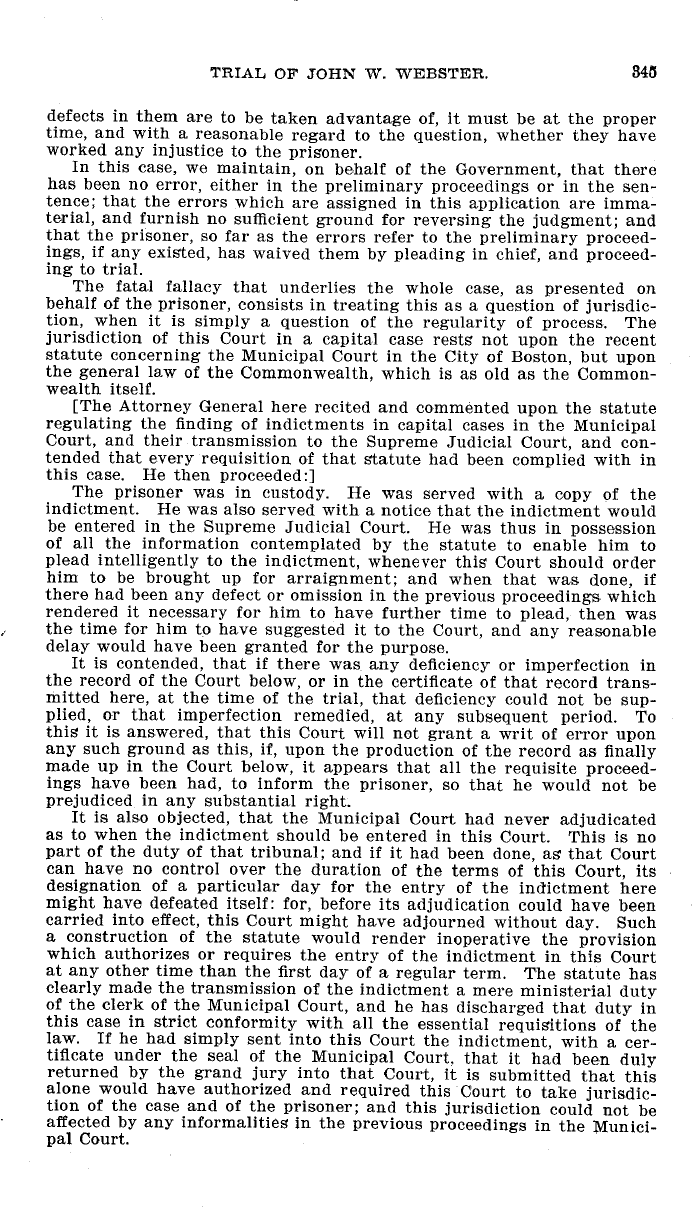|
TRIAL OP" JOHN W. WEBSTER. 341E
defects in them are to be taken advantage of, it must be at the proper
time, and with a reasonable regard to the question, whether they have
worked any injustice to the prisoner.
In this case, we maintain, on behalf of the Government, that there
has been no error, either in the preliminary proceedings or in the sen-
tence; that the errors which are assigned in this application are imma-
terial, and furnish no sufficient ground for reversing the judgment; and
that the prisoner, so far as the errors refer to the preliminary proceed-
ings, if any existed, has waived them by pleading in chief, and proceed-
ing to trial.
The fatal fallacy that underlies the whole case, as presented on
behalf of the prisoner, consists in treating this as a question of jurisdic-
tion, when it is simply a question of the regularity of process. The
jurisdiction of this Court in a capital case rests not upon the recent
statute concerning the Municipal Court in the City of Boston, but upon
the general law of the Commonwealth, which is as old as the Common-
wealth itself.
[The Attorney General here recited and commented upon the statute
regulating the finding of indictments in capital cases in the Municipal
Court, and their transmission to the Supreme Judicial Court, and con-
tended that every requisition of that statute had been complied with in
this case. He then proceeded:]
The prisoner was in custody. He was served with a copy of the
indictment. He was also served with a notice that the indictment would
be entered in the Supreme Judicial Court. He was thus in possession
of all the information contemplated by the statute to enable him to
plead intelligently to the indictment, whenever this Court should order
him to be brought up for arraignment; and when that was done, if
there had been any defect or omission in the previous proceedings which
rendered it necessary for him to have further time to plead, then was
the time for him to have suggested it to the Court, and any reasonable
delay would have been granted for the purpose.
It is contended, that if there was any deficiency or imperfection in
the record of the Court below, or in the certificate of that record trans-
mitted here, at the time of the trial, that deficiency could not be sup-
plied, or that imperfection remedied, at any subsequent period. To
this it is answered, that this Court will not grant a writ of error upon
any such ground as this, if, upon the production of the record as finally
made up in the Court below, it appears that all the requisite proceed-
ings have been had, to inform the prisoner, so that he would not be
prejudiced in any substantial right.
It is also objected, that the Municipal Court had never adjudicated
as to when the indictment should be entered in this Court. This is no
part of the duty of that tribunal; and if it had been done, as that Court
can have no control over the duration of the terms of this Court, its
designation of a particular day for the entry of the indictment here
might have defeated itself: for, before its adjudication could have been
carried into effect, this Court might have adjourned without day. Such
a construction of the statute would render inoperative the provision
which authorizes or requires the entry of the indictment in this Court
at any other time than the first day of a regular term. The statute has
clearly made the transmission of the indictment a mere ministerial duty
of the clerk of the Municipal Court, and he has discharged that duty in
this case in strict conformity with all the essential requisitions of the
law. If he had simply sent into this Court the indictment, with a cer-
tificate under the seal of the Municipal Court, that it had been duly
returned by the grand jury into that Court, it is submitted that this
alone would have authorized and required this Court to take jurisdic-
tion of the case and of the prisoner; and this jurisdiction could not be
affected by any informalities in the previous proceedings in the Munici-
pal Court.
|

